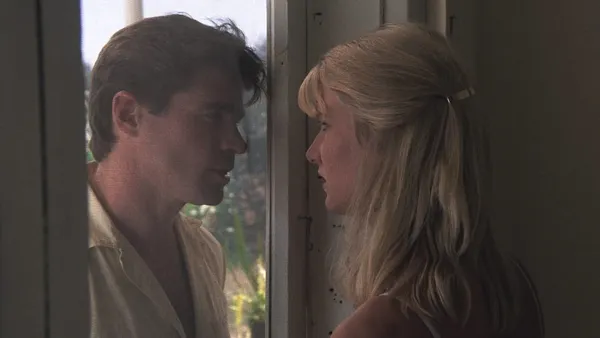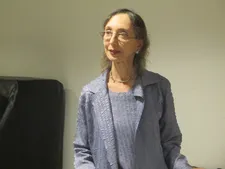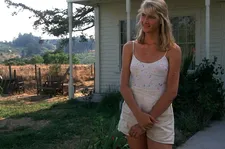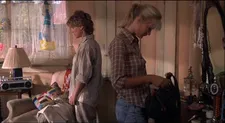 |
| Joyce Carol Oates on Smooth Talk: “Our species is so impressionable, we’re very vulnerable to any kind of mesmerising person …” |
Joyce Chopra’s Smooth Talk, starring Laura Dern with Treat Williams, Mary Kay Place (Diane in Kent Jones’s award-winning début feature Diane), Levon Helm, Elizabeth Berridge, Margaret Welsh, Sara Inglis, and Geoff Hoyle, is a highlight in the Revivals programme of the 58th New York Film Festival. The screenplay by Tom Cole is based on Joyce Carol Oates’ short story, Where Are You Going, Where Have You Been?
Dern’s Connie, a giggly 16-year old when out at the beach or the mall (cinematographer James Glennon lovingly embraces American ugliness, as he will later do in Alexander Payne’s Citizen Ruth, Election and About Schmidt) with her girlfriends Laura (Margaret Welsh) and Jill (Sara Inglis), is more sombre and a different kind of unruly at home with her parents and well-behaved sister June (Elizabeth Berridge).
 |
| Joyce Carol Oates: “I think also the movie is a brilliant, poetic work of naturalism …” Photo: Anne-Katrin Titze |
Connie squabbles with her mother Katherine (Mary Kay Place), about lots of things, mostly what’s in her head. “All I see are a bunch of trashy daydreams,” the mother says. The interactions with both parents (the father is played by The Band’s Levon Helm) feel drunk while sober, somehow off, as if wrapped in cotton wool or taking place in a cardboard box.
The Arnold Friend (Treat Williams) of Smooth Talk is less Mephistopheles hiding a cloven hoof in his black cowboy boot, than a grinning James Dean knockoff who postures on his car like a serpent, stretching his arms, hypnotising Connie with his voice to come and take a ride with him.
Dern, who wears a white, very Eighties bathing suit and white shorts during these tense threshold scenes (instead of the bright green shirt in the story), is enthralling and not too far away from where she will lead us in David Lynch’s masterpiece Blue Velvet. When the big bad wolf says “You might not ever want to get away,” the cardboard box collapses. It is comforting to keep in mind that the devil cannot cross your threshold without an invitation. Where Oates’ narrative ends, Smooth Talk continues, but leaves us with just as many, if different, open questions.
 |
| Laura Dern: “Like, Joyce Carol Oates, you said, it’s just so terrifying how that age person can see things so shockingly different.” Photo: Anne-Katrin Titze |
At the New York Film Festival Smooth Talk Zoom Webinar with Laura Dern, Joyce Chopra, and Joyce Carol Oates, moderator Alicia Malone selected two of my comments and questions for the participants to respond to.
Anne-Katrin Titze (for Joyce Chopra and Joyce Carol Oates): How did you balance the devilishness for Treat Williams’ performance as Arnold Friend? He is not able to cross the threshold without an invitation. (In the short story there is a very original hint that he may have the cloven hoof of the devil.)
Joyce Carol Oates: Well, the story does reach a sort of surreal level. So that all along he can see into the future and he has powers of imagination. It [Where Are You Going, Where Have You Been?] had as its model a sort of Nathaniel Hawthorne parable about Death And The Maiden.
We think of medieval woodcuts in which a maiden, a beautiful young girl, is looking adoringly at her reflection in a mirror and Death is behind her, this figure of Death, and she doesn’t see it. This was the common theme in the medieval sensibility, that Death is coming for you and so you shouldn’t be so vain, you should look to God. It was sort of like religious ammunition.
 |
| Joyce Chopra on Laura Dern as Connie: “She transitioned into trying to take some sort of control, away from his power.” |
Joyce Chopra: It’s very particular to the actor’s choice. His choice is that he’s very vain and he prides himself on seducing girls to come out on their own volition. He doesn’t really want to come in the house. It would be a defeat for him if he had to use force.
JCO: I think also the movie is a brilliant, poetic work of naturalism and to introduce any supernatural element into the film really would be incongruous.
JC: In the very end he says to her his last line, “My sweet little blue-eyed girl.” And that’s how the short story ends. We added - I can’t remember, we were all collaborating - “What if my eyes were brown?” That’s a moment where she transitioned into trying to take some sort of control, away from his power.
JCO: He is seeing her as a cliché, but declaring no, I am not that.
AKT (for Laura Dern): The switch in your performance as Connie when Arnold Friend shows up at your house is chilling and mesmerising to watch. Do you recall what went through your mind?
 |
| Connie (Laura Dern) with her mother (Mary Kay Place): “That’s the thing, too, it’s an age where everybody feels cruel.” |
Laura Dern: I was moved by [Alicia Malone] suggesting and bringing up to Joyce Carol Oates this idea of performative behaviour. And I think that was probably the switch, is how I was behaving for this adult man, who was paying interest in me. And that was a completely different person than I was with my family or with the boys that I felt I was above, ultimately. And we’re a little bit cruel.
That’s the thing, too, it’s an age where everybody feels cruel. My mom was cruel, my sister was cruel, the boys, mean girls are cruel. And here comes this nice older man who sees me like nobody else and knows that I deserve seeming attention, tenderness. Like, Joyce Carol Oates, you said, it’s just so terrifying how that age person can see things so shockingly different. But I think that’s how I perceived it in the character. The safe place.
JCO: I was going to say that our species is so impressionable, we’re very vulnerable to any kind of mesmerising person who seems to address us and make us feel special. Including politicians, you know, this is some sort of black magic that is exacted on particularly vulnerable people.
 |
| Laura Dern on Connie outside with Arnold Friend (Treat Williams): “I think that was probably the switch, is how I was behaving for this adult man, who was paying interest in me.” |
Alicia Malone: Yeah, Joyce Carol Oates, can you talk a little bit about that more because something that struck me in reading the story was how at times Connie thinks: Is that the voice from the radio? Haven’t I met him? She’s going through so many different thoughts in her mind that it’s like he’s gaslighting her.
JCO: Absolutely, as we said before, it was a pre-Charles Manson time [1966]. Charles Manson and his family are the best examples of this sort of seduction of vulnerable, not unattractive girls. But they were very vulnerable and he cast a kind of spell on them.
Smooth Talk will open virtually at Film at Lincoln Center starting on November 6.
The 2020 New York Film Festival runs through October 11.
























